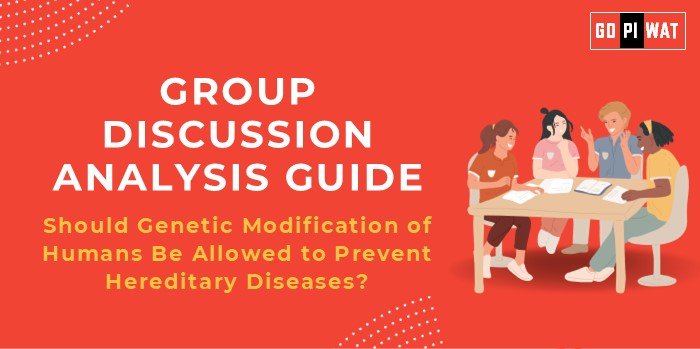📋 Group Discussion (GD) Analysis Guide
🧬 Should Genetic Modification of Humans Be Allowed to Prevent Hereditary Diseases?
🌐 Introduction to the Topic
Opening Context: “The field of genetic modification has revolutionized medicine, offering unprecedented possibilities to prevent hereditary diseases. However, the ethical, societal, and scientific implications make it a highly debated topic.”
Topic Background: The concept of genetic modification stems from advancements in CRISPR-Cas9 and gene-editing technologies, which allow precise modifications in the DNA of living organisms. First applied in experimental medicine, these tools have opened doors to altering human genes to eliminate hereditary diseases such as Huntington’s disease, cystic fibrosis, and sickle cell anemia.
📊 Quick Facts and Key Statistics
- CRISPR Success Rate: 70% accuracy in correcting genetic mutations in clinical trials (2023) – showcases the feasibility of editing genetic disorders.
- Genetic Disorders Prevalence: 1 in 10 people globally is affected by a genetic disorder – emphasizes the potential scale of impact.
- Cost Reduction: Gene-editing costs have dropped from $10,000 per experiment in 2010 to less than $500 in 2023 – demonstrates accessibility improvements.
- Ethical Concerns: Over 60% of surveyed bioethicists in 2022 express concerns about unintended consequences of human genetic editing – highlights societal apprehension.
👥 Stakeholders and Their Roles
- Governments: Regulate genetic modification technologies and create ethical frameworks.
- Healthcare Organizations: Conduct clinical trials and provide therapies for patients with genetic disorders.
- Scientists: Innovate and refine gene-editing tools to ensure safety and efficacy.
- Ethicists and Advocacy Groups: Evaluate societal implications and protect against misuse.
- Patients and Families: Seek access to life-saving treatments while navigating moral dilemmas.
🏆 Achievements and Challenges
Achievements:
- Clinical Breakthroughs: Successful gene-editing treatments for rare disorders like beta-thalassemia and sickle cell anemia.
- Cost-Effective Solutions: Reduced costs make the technology accessible for broader application.
- Precision Medicine: Tailored treatments with high success rates in hereditary disease prevention.
Challenges:
- Ethical Dilemmas: Concerns about “designer babies” and genetic inequality.
- Long-Term Effects: Lack of comprehensive data on multigenerational impacts.
- Regulatory Gaps: Global inconsistency in genetic modification policies.
🌍 Global Comparisons
- China: Pioneered CRISPR trials but faced backlash over ethical violations in germline editing.
- USA: Established robust frameworks under the FDA for therapeutic genetic modification.
- Germany: Maintains a stringent ban on human germline editing, citing moral concerns.
📚 Structured Arguments for Discussion
- Supporting Stance: “Genetic modification provides a transformative tool to eliminate hereditary diseases, enhancing quality of life and reducing healthcare burdens.”
- Opposing Stance: “The long-term risks and ethical dilemmas of human genetic modification outweigh its potential benefits.”
- Balanced Perspective: “While genetic modification holds great promise for combating hereditary diseases, its application should be regulated to ensure ethical and safe use.”
🛠 Effective Discussion Approaches
- Opening Approaches:
- Highlight a recent breakthrough, such as successful gene-editing therapy for a life-threatening disease.
- Start with a statistic showing the prevalence and impact of hereditary diseases globally.
- Discuss a high-profile ethical debate, such as the CRISPR baby controversy.
- Counter-Argument Handling:
- “While concerns about designer babies are valid, regulatory oversight can prevent misuse while advancing life-saving treatments.”
🧩 Strategic Analysis of Strengths and Weaknesses
- Strengths: Medical breakthroughs, cost efficiency, and precision medicine.
- Weaknesses: Ethical dilemmas, potential misuse, and inconsistent regulations.
- Opportunities: Eliminate genetic disorders, reduce healthcare costs, and position as a global leader in biotechnology.
- Threats: Public mistrust, unintended consequences, and bioterrorism risks.
🎓 Connecting with B-School Applications
- Real-World Applications: Genetic modification links to healthcare project management, ethical policy formulation, and biotech entrepreneurship.
- Sample Interview Questions:
- “What regulatory frameworks are needed for ethical genetic modification?”
- “How can genetic editing contribute to reducing global healthcare disparities?”
- Insights for Students: Consider the business potential in biotech innovations, the ethical challenges in healthcare leadership, and the implications for public policy.


